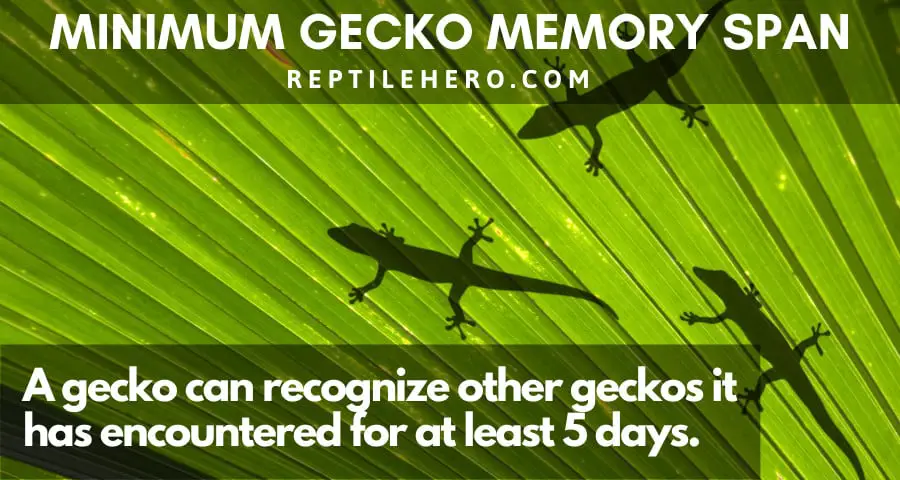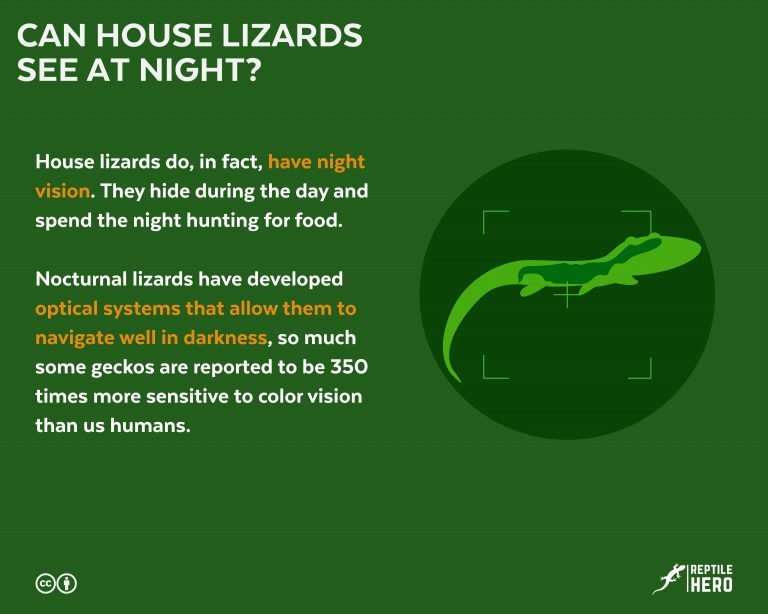Can Geckos Remember? More Than You Think
For many people, geckos aren’t considered bright animals so they tend to think that these reptiles are incapable to remember. However, many experienced keepers and herpetologists would argue otherwise. Surprisingly, their memory may be on par with ours!
Generally speaking, experts believe that geckos can store memory from just a few days up to several years. A reliable memory allows a gecko to thrive. They can remember and use past experiences and accumulated knowledge to help them determine how they will react or solve a problem.
Do geckos forget after just a few seconds? Yes and no—it’s complicated! Read on to understand the science behind your gecko’s memories.
What is the Memory Span of Geckos?
The average gecko is capable of remembering over the course of 5 days at the very least. Experienced gecko keepers and researchers have, however, also observed that geckos are capable of not only remembering but also recognizing various information (e.g., name, scent, etc.) after years of initial presentation.
I still see a lot of newbie pet parents get put down and dismissed when they ask about a gecko’s ability to remember for a long period of time. As such, I thought that I really need to address this question.
By doing so, beginner reptile owners can hopefully find the answers they are looking for without feeling like their questions are not valid.
Most, if not all animals, are capable of forming and recalling memories [1]. Their memories are composed of a variety of different experiences that may be unique to them, and could also be shared with others.
Considering how long they can live, it should come as no surprise that geckos can indeed remember.
Just keep in mind that their ability to store memories most possibly ranges anywhere from a couple of seconds to many years—which, in reality, is the case for us humans!
Geckos Remembering for Days
One experiment, in particular, has shown that geckos are capable of remembering information several days after initial exposure.

In this 2006 study, the researchers weren’t interested in determining the memory span of a leopard gecko (Eublepharis macularius) [2]. They were actually trying to see whether or not males would be able to tell old and new females apart.
Nevertheless, this is one of the only scientific papers currently available that provides actual numerical data for how far back a gecko can remember.
So how were they able to discover this?
To simplify, the experiment was done as follows:
- Male geckos were introduced to three potential breeding partners each, only one of which will serve as the “novel” partner.
- The scientists allowed the male to meet with the first familiar partner every day for five days, the second familiar partner for only four days, and the new partner for only one day—the last day.
- Finally, they compared the data they collected and were able to demonstrate that geckos are capable of distinguishing the new partner from the familiar females. Males put less effort into trying to woo familiar females after being constantly rejected and enthusiastically started courting new ones.
In other words, geckos are capable of remembering other geckos they come across for a minimum of 5 days after their first encounter.
Typically, I would avoid generalizing this to other aspects of a gecko’s life. However, I’m fairly certain that is true for a lot of things—shelter, hunting, and so much more.
Geckos Remembering for Years
Both regular keepers and scientists dealing with geckos believe that geckos are capable of retaining memories for many months, and even years. Such memories may have a unique aspect and/or biological importance to the animal.
Many pet owners who started keeping geckos at a young age would probably have a similar story. A story of being recognized by their little scaly after being apart for months or years without any contact with each other.
Learn more about reptile recognition in our article on geckos remembering their owners.
I typically hear such instances when a student goes back home after moving out for college. Because not everyone can take their pets with them—for various reasons I won’t get into—they usually have no choice but to leave behind their geckos in the care of a close friend or family.
But after meeting their gecko again, it’s like they only said goodbye to each other the day before! Of course, some geckos also take a while before recognizing their owners.
I have also heard similar stories from researchers, especially when they had prolonged encounters with each other during a study.
Some would argue that this only happens because these animals have learned to associate us with comfort—food, heating, security, etc. But even if that is the case, it only further confirms that geckos are capable of remembering for a long time!
My Final Verdict on the Memory Span of Geckos
A gecko can indeed form and remember memories, regardless of whether they are wild specimens or captive pets. However, what is uncertain is the upper limit of their memories (i.e., how far back they can recall).
First off, I would like to counter the claims that geckos are incapable of remembering after just a few seconds. The phrasing alone gives room for a lot of confusion because memory is quite complex—there are short-term and long-term ( more on that later.)
If that were true, then our precious geckos would probably not have very long lives due to the constant stress—nothing seems familiar and everything is viewed as dangerous.
Despite being part of the reptile-keeping community for several years, I have still yet to find conclusive research studies on how long geckos can retain information. In other words, we don’t know for certain how far back in their lives geckos are capable of remembering.
To further complicate things, there are no standardized tests that can determine the exact memory span of geckos and reptiles, in general. Even tests for spatial memory (navigation) alone are still being systematized.
Find out more about spatial cognition in our article on gecko intelligence.
This can be primarily attributed to the fact that only recently has there been a growing interest in cold-blooded cognition in research. Who knows, we might be able to get memory test kits for our geckos in the future. Now, doesn’t that sound interesting?
The Reptile Brain and Remembering (Busting Memory Myths)
Geckos do not have brain structures identical to mammals that are involved in the creation, processing, and recall of memory. However, they do have comparable parts of the brain that function similarly. In particular, reptiles possess a medial cortex which has an important role in memory.
In reality, scientists still don’t fully understand our own memories, let alone how our minds work. So it makes sense that a good number of reptile keepers and breeders still hold a lot of outdated notions about the reptile brain.
Years ago, scientists believed that geckos were incapable of engaging in high-level cognitive tasks such as forming memories and recalling past events and information. Primarily, this is because geckos did not have the same brain structures we have.
But recent research proves otherwise. A gecko’s medial cortex, for example, is the reptile equivalent of the mammalian hippocampus which has an essential role in both learning and memory.
Gecko Memory: On Remembering and Forgetting
How do memories work? Well, similar to mammals, reptiles likely have short-term and long-term memory [3].
Reptiles like geckos first encounter a new object/animal or experience a new situation. During this time the short-term memory is activated and the information being received is processed.
For a gecko to get any information, it has to pay attention to its surroundings and what is happening. Then it will either be stored or not. Sadly, the underlying processes for this are still not completely understood.
Not all information obtained by a gecko will be consolidated into the long-term memory for future retrieval (remembering). Information could be disposed of or saved.
The popular hypothesis is that animals will only save biologically relevant information in their long-term memory:
- Which insect is okay to eat
- What path to take to return to their refuge site
- Who provides and takes care of them
- How to avoid a predator
- Where it is safe to escape
So if a gecko obtains useless information in its short-term memory, it is likely to readily forget it since that won’t largely affect its chances for survival.
But even when information is successfully stored in their long-term memory, there is a chance that it will be forgotten. For me, this makes a lot of sense since even humans forget important details and events.
Why Do Geckos Remember?
Memory has a valuable adaptive role in the life of geckos and many other reptiles. As ectothermic animals, this is crucial as geckos need to be able to conserve as much energy and heat as possible.
If a gecko had to learn and relearn everything from the start it would waste a lot of its resources and quickly lose body heat.
Just imagine if that was indeed the case for your little lizard. You gecko would have to learn how to walk every time it has to move, it would have to perpetually try to catch a live insect to feed, and so on.
Having a variety of useful memory at its disposal, a gecko will be able to learn how to do something as soon as it completes the first trial—errors and all if any. It also serves as a sort of cheat sheet for important details related to location, foraging, and the like.
Moreover, memory is also necessary for training and conditioning.
Learn more about conditioning in our article on training geckos.
Exploring the Memory of Other Reptiles (Lizards to Turtles)
Many other reptiles have also wowed people with how far back they can remember! This includes other lizards, turtles, tortoises, and even crocodiles!
Lizards
Below are incredible examples that showcase lizard memory.
1. Same Partner

Shingleback lizards (Tiliqua rugosa) generally look for the same mating partner despite not staying together throughout their lives. Pairs typically search for each other during the breeding season.
2. Problem-Solvers
Monitor lizards (Varanus spp.) and beaded lizards (Heloderma sp.) were not only able to remember how to solve a task after a hiatus of almost 2 years, they also started solving it faster with every attempt [4]!
3. A Cautious Reunion
Fido, the laboratory pet iguana at Saint Joseph’s University in Philadelphia, would bob its head upon seeing students that took care of him 4 years earlier. However, the scientists don’t think that the iguana displayed such behavior out of fondness [5].
4. Getting Food
Studies have shown that side-blotched lizards (Uta stansburiana) have remarkable spatial memory [6]. They can correctly make their way through a maze to get food after enough tries!
Turtles and Tortoises
Similar to lizards, turtles and tortoises have long been recognized for having great memories. They have demonstrated their ability to retain and recall information for many years, and even decades.
Red-footed tortoises (Chelonoidis carbonaria), for example, were taught several visual cues that correspond to different food items [7]. Then, after a year and a half, they were tested again. Guess what? They were able to correctly distinguish between the cues and select the best option!
Take note, during the time between being taught and being retested, they were not given any opportunity to put what they learned into practice. This makes their accomplishment all the more astonishing.
Aside from that, sea turtles have long been known to return to the very same beach they came hatched at to lay their eggs. They can do this even after not being able to go back to that particular location for several decades.
Crocodiles and Alligators
One experienced reptile trainer who mainly handled alligators and crocodiles strongly believes that they are capable of retaining and remembering for decades. In particular, they can recognize their trainers even after being apart for numerous years.
He was able to observe just how good their memory was numerous times. In each incident, he had no contact whatsoever with the animals. They were not trained in the same way he did before they left his care.
Yet when he approached and called them individually by their name, they responded in the same way they did back then. This is because he trained them to respond to the name he had given them all those years ago.
What’s even more amazing is that they showed no signs of aggression toward him at all! Rather, they let him touch and hand-feed them.
Further Questions
Can geckos remember everything they see and experience?
Like the average human, geckos do not retain all information they obtain throughout their lives. Geckos are capable of remembering for a good amount of time. But it is inevitable for them to forget information, especially if it is not essential for ensuring their survival.
Is it possible for geckos to experience memory loss?
Though there are no studies to prove this, it is possible for geckos to experience memory due to brain damage or cognitive diseases. A specific morph of leopard geckos, for instance, is widely known for a neurological condition called Enigma Syndrome which affects cognition.
Do geckos miss their owners?
It is unclear whether a gecko can miss its owner. However, there are stories of geckos recognizing their caretakers even after years of not seeing or being near each other.
Can geckos remember people?
Geckos are capable of remembering people. More surprisingly, they can even show a preference for a certain person or people. Case in point, a gecko may allow only a specific person to pet it. This lizard could also only actively and calmly approach a select few people.
Summary of How Far Back Can Geckos Remember?
Geckos have relatively good memories which they can still remember years later. However, more research is needed to quantify the lower and upper limits of a gecko’s ability to remember through time.
The ability to form, process, and use memories allow geckos to not only survive but also thrive. It provides them with a myriad of vital information including, but not limited to, secure refuge sites, successful foraging strategies, and locations abundant in resources.
Sources
[2] https://www.jstor.org/stable/4536392
[3] https://www.ncbi.nlm.nih.gov/pmc/articles/PMC2657600/
[5] http://www.anapsid.org/recognition.html
[6] https://reptilesmagazine.com/six-studies-on-reptile-intelligence/
[7] https://royalsocietypublishing.org/doi/pdf/10.1098/rsbl.2016.0853



![14 Reasons For Having A Gecko [+7 More That Your Child Will Love]](https://www.reptilehero.com/wp-content/uploads/2021/04/Reason-Kids-Gecko-As-a-Pet-768x614.jpg)


